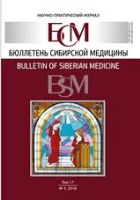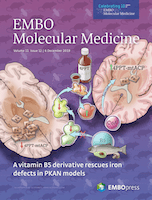
TRENDS IN MOLECULAR MEDICINE
Scope & Guideline
Bridging Molecular Insights with Therapeutic Impact
Introduction
Aims and Scopes
- Molecular Pathogenesis and Mechanisms:
Research exploring the molecular underpinnings of diseases, including genetic, epigenetic, and environmental factors affecting disease progression. - Translational Medicine:
Research aimed at bridging laboratory discoveries with clinical applications, focusing on how molecular insights can inform treatment strategies and improve patient outcomes. - Therapeutic Innovations:
Investigations into novel therapeutic approaches, including drug development, gene therapy, and immunotherapy, highlighting cutting-edge treatments and their mechanisms of action. - Interdisciplinary Approaches:
Integration of various scientific disciplines, such as genomics, immunology, and bioinformatics, to address complex health issues and enhance understanding of disease mechanisms. - Public Health and Epidemiology:
Studies examining the broader implications of molecular medicine on population health, including genetic epidemiology and the impact of socio-environmental factors on disease.
Trending and Emerging
- Precision Medicine and Genomics:
An increasing focus on personalized medicine, utilizing genomic data to tailor treatments to individual patients, aiming for more effective and targeted therapies. - Microbiome Research:
Exploration of the role of the microbiome in health and disease is gaining traction, particularly in understanding its influence on treatment responses and disease mechanisms. - Immunotherapy Advances:
Significant attention is being given to immunotherapy, especially in cancer treatment, as researchers explore novel strategies to enhance immune responses against tumors. - Long COVID and Post-Acute Sequelae:
Emerging studies on long COVID and its related syndromes are trending, reflecting a growing understanding of post-viral complications and their molecular basis. - Regenerative Medicine and Stem Cell Therapy:
Research in regenerative medicine, particularly the application of stem cells in treating degenerative diseases, is becoming increasingly prominent, showcasing innovative therapeutic avenues.
Declining or Waning
- Traditional Pharmacology:
Research focused solely on traditional drug development processes is increasingly overshadowed by innovative modalities such as gene therapy and personalized medicine. - Basic Science without Clinical Relevance:
Papers that do not connect basic research to clinical applications are becoming less frequent, as there is a growing demand for translational studies that have direct implications for patient care. - Single-Disease Focus:
Research that exclusively targets single diseases without considering comorbidities or the broader context of patient health is declining, as the field moves towards a more holistic view of health.
Similar Journals

Genome Medicine
Catalyzing Discoveries in Molecular MedicineGenome Medicine is a prestigious, peer-reviewed journal published by BMC, focusing on the rapidly evolving fields of genetics, molecular biology, and molecular medicine. Established in 2009 and boasting an open-access format, it has become a leading platform for disseminating high-quality research findings that advance our understanding of genetic diseases and therapeutic innovations. With an impressive Q1 ranking across multiple relevant categories—in particular, genetics (clinical), molecular biology, and molecular medicine—this journal is recognized for its substantial impact in the academic community, as evidenced by its exceptional placement in Scopus rankings. By providing unrestricted access to groundbreaking studies, Genome Medicine fosters collaboration and knowledge sharing among researchers, clinicians, and educators, thus playing a vital role in the transition from fundamental genetic research to clinical applications. Researchers are encouraged to contribute their findings and insights, further solidifying the journal’s position as a pivotal resource for those dedicated to advancing genomic medicine.

Byulleten Sibirskoy Meditsiny
Advancing Molecular Medicine Through Open Access ResearchByulleten Sibirskoy Meditsiny, published by the Siberian State Medical University, is a pivotal open-access journal in the field of Molecular Medicine, with its current edition indexed under the ISSN 1682-0363. Since its transition to open access in 2013, the journal aims to disseminate high-quality research and advancements in biomedical sciences, particularly focusing on molecular mechanisms and therapeutic interventions. Despite its relatively recent recognition in Molecular Medicine, where it ranks in the 6th percentile, the journal is dedicated to fostering knowledge exchange and collaboration among researchers, professionals, and students alike. With a modest impact factor and quarterly publication, Byulleten Sibirskoy Meditsiny is positioned to serve as a valuable resource for those engaged in the intricate realms of molecular biology, biochemistry, and general medicine, contributing to the broader scientific discourse in the Russian Federation and beyond.

Translational Pediatrics
Transforming Discoveries into Pediatric Innovations.Translational Pediatrics is a leading journal in the field of Pediatrics, specializing in bridging the gap between laboratory research and clinical practice. Published by AME Publishing Company in Hong Kong, this journal aims to promote the translation of scientific discoveries into innovative interventions for child health. With its ISSN 2224-4336 and E-ISSN 2224-4344, the journal is accessible to a global audience, enhancing knowledge sharing among researchers, clinicians, and educators. Recognized in 2023 as a Q2 category journal in Pediatrics, Perinatology, and Child Health, it ranks 72nd out of 330 according to Scopus, placing it in the top 22% of its category. With an impactful Convergence of research from 2015 to 2024, Translational Pediatrics is dedicated to providing an essential platform for high-quality studies that advance pediatric care and foster best practices in child health.

Biomedical Reports
Innovating research for a healthier tomorrow.Biomedical Reports, published by SPANDIDOS PUBL LTD in Greece, is a distinguished open-access journal that focuses on the dynamic fields of biochemistry, genetics, molecular biology, medicine, pharmacology, and neuroscience. Established in 2014, the journal has rapidly gained recognition, securing Q2 and Q3 rankings in several categories for 2023, including a notable ranking of #125/636 in General Medicine, placing it in the 80th percentile amongst its peers. The journal continually aims to disseminate innovative research findings that advance the understanding of complex biomedical issues, making it an invaluable resource for researchers, professionals, and students alike. Its multidisciplinary approach not only reflects the interconnectivity of modern biomedical sciences but also promotes collaborative discourse among diverse fields, ensuring ongoing relevance and impact within the scientific community.

CLINICAL AND EXPERIMENTAL MEDICINE
Connecting Researchers and Practitioners for Better HealthClinical and Experimental Medicine is a leading journal published by Springer-Verlag Italia SRL, dedicated to advancing the understanding of the intricate relationships between biomedical research and clinical applications. Since its inception in 2001, the journal has garnered an esteemed reputation, achieving Q1 quartile rankings in 2023 in both Biochemistry, Genetics and Molecular Biology (miscellaneous) and Medicine (miscellaneous), establishing itself as a key resource for researchers and practitioners alike. With an impactful contribution reflected in its Scopus rankings, particularly a #81/221 rank in the General Biochemistry, Genetics and Molecular Biology category, Clinical and Experimental Medicine serves as a rich platform for peer-reviewed articles that bridge theory and practice across diverse medical disciplines. The journal embraces Open Access options, broadening the accessibility of groundbreaking research to a global audience, thereby fostering collaboration and innovation. Located in Milan, Italy, it continually endeavors to enrich knowledge and share valuable insights essential for the advancement of health sciences.

Human Genomics
Connecting Innovators in Genetic ResearchHuman Genomics, published by BMC, is a leading open-access journal dedicated to advancing the field of genomics and its applications in health and disease. Since its inception in 2003, the journal has provided a vital platform for researchers to disseminate groundbreaking findings related to genetic research, contributing significantly to areas such as Drug Discovery, Genetics, Molecular Biology, and Molecular Medicine, as reflected in its Q1 and Q2 quartile rankings throughout 2023. With an ISSN of 1473-9542 and an E-ISSN of 1479-7364, Human Genomics not only delivers high-quality, peer-reviewed research but also ensures accessibility to a broader audience, empowering professionals, students, and academics to stay at the forefront of genomic science. Through its rigorous editorial standards and impactful publications, the journal fosters a collaborative environment for innovative research across the globe from its base in the United Kingdom. By promoting open access since its launch, Human Genomics continues to enhance the visibility and impact of genetic studies, making it an essential resource for anyone involved in the rapidly evolving field of human genomics.

Biomed Research International
Exploring the frontiers of biomedicine for a healthier future.Biomed Research International is a prominent open access journal published by HINDAWI LTD, dedicated to advancing the field of biomedical research. With its ISSN 2314-6133 and E-ISSN 2314-6141, this journal has been a significant contributor to the scientific community since its inception in 2013, making scholarly work accessible to a global audience. The journal's scope encompasses a range of disciplines, including biochemistry, genetics, molecular biology, immunology, microbiology, and medicine, reflecting its commitment to interdisciplinary research. Ranked in the Q2 quartile as of 2023 across several relevant categories, Biomed Research International is recognized for its high-quality publications that foster innovation and collaboration in biomedical studies. Researchers, professionals, and students looking to share and gain insights into cutting-edge biomedical discoveries will find this journal an essential resource. With a focus on rapid dissemination of research findings, the journal serves as a vital platform for academics to engage with contemporary issues in health and disease, ultimately contributing to the advancement of medical science.

MedComm is a distinguished Open Access journal published by Wiley, located in the United States. Since its inception in 2020, it has rapidly established itself as a leading platform for cutting-edge research in the fields of Biochemistry, Cell Biology, Drug Discovery, Genetics, Immunology and Allergy, and Oncology, achieving a prestigious Q1 category ranking across multiple disciplines in 2023. MedComm is committed to providing a rigorous and transparent peer-review process, ensuring the publication of high-quality articles that advance the frontiers of medical science. With its remarkable Scopus ranking, the journal serves as an invaluable resource for researchers, professionals, and students looking to stay abreast of important developments in the life sciences. The open access model facilitates widespread dissemination of scholarly work, fostering collaboration and innovation within the global scientific community. Researchers interested in submitting their work or exploring the latest findings are encouraged to engage with this pivotal journal during the converged years from 2020 to 2024.

FASEB BioAdvances
Exploring Breakthroughs in Biological ResearchFASEB BioAdvances, published by WILEY, is an esteemed open-access journal dedicated to advancing the fields of biochemistry, molecular biology, and physiology. Since its inception in 2019, the journal has rapidly established a significant presence within the academic community, boasting an impressive impact factor reflective of its Q2 and Q3 standings across various categories, including Biochemistry, Genetics and Molecular Biology, Cancer Research, Molecular Medicine, and Physiology. The journal aims to disseminate high-quality research and innovative findings to enhance the understanding of biological processes, making it a vital resource for researchers, professionals, and students alike. With its commitment to open access, FASEB BioAdvances ensures that groundbreaking research is available to a global audience, facilitating collaboration and exploration in these rapidly evolving scientific domains.

EMBO Molecular Medicine
Exploring the Intersection of Biology and HealthEMBO Molecular Medicine, published by WILEY, stands as a premier forum within the field of molecular medicine, advancing scholarly dialogue and research since its launch in 2009. With an impressive impact factor reflected in its Q1 categorization and ranking as the 12th journal in the discipline of Molecular Medicine by Scopus, it serves as a vital resource for researchers, professionals, and students alike. Operating under an Open Access model, EMBO Molecular Medicine ensures that cutting-edge research is freely accessible, fostering greater collaboration and innovation among the global scientific community. Located in the United Kingdom, the journal encompasses a broad scope, featuring high-quality studies that bridge the gaps between basic molecular biology and clinical applications, making significant impacts on health and disease. With a commitment to excellence and a continuously evolving repertoire of research, this journal play a crucial role in shaping the future of biomedical research and therapy.